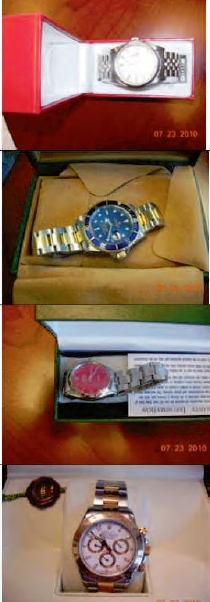EXPLOSIVE REVELATION: FBI, IRS Find More Than $400,000 In Stashed Loot In Trevor Cook Ponzi Case, Including More Than $200,000 In $100 Bills, Gold Coins, Watches, Baseball Cards
Trevor Cook’s brother was hiding more than $400,000 in cash and valuables from a $190 million Ponzi scheme, according to an extraordinary statement by the court-appointed receiver in the case.
The loot was found July 23 — after Trevor Cook, whose plea agreement in the case required him to submit to a lie-detector test if requested by the government — “flubbed” the test, according to the Star Tribune of Minneapolis/St. Paul.
Graham Cook, Trevor Cook’s brother, has not been charged in the case. But the revelation that proceeds from the scheme allegedly were under his control and concealed for months from investigators and two federal judges presiding over elements of the case raise troubling, new questions about Trevor Cook’s capacity to tell the truth in any context and whether Cook and others had stashed money elsewhere.
Trevor Cook was jailed in January by Chief U.S. District Judge Michael J. Davis for concealing assets and spending money frozen by court order on Nov. 23, 2009. Davis, who is presiding over the civil elements of the case filed by the SEC and the CFTC, said the government had established that Cook had violated the court order.
At the time, Cook made a technical argument that he had not been properly served in the case at the Van Dusen mansion in Minneapolis on Nov. 24 and thus was not bound to follow the order, a position that gave short shrift to the hundreds of victims in the case, some of whom had been rendered destitute.
Victims complained that Cook was thumbing his nose at both the court and investors. Cook also asserted his 5th Amendment right against self-incrimination, which caused victims to wonder what else he could be hiding.
Davis did not buy any of Cook’s story, and jailed him.
“[C]opies of said Orders were shown to Cook, and the relevant portions of the Orders were explained to him by the Receiver” on Nov. 24, 2009, Davis ruled. Regardless, Cook later used frozen assets to purchase $7,510 in gift cards from Cub Foods and $16,000 in gift cards from Target.
“Given the amount of investor money at issue, and Cook’s repeated violations of the Asset Freeze Orders, the Court finds that the appropriate remedy for the contempt finding in this case is to incarcerate Cook until such time as he purges such contempt.”
Jail was an appropriate remedy for Cook, even in a civil case, a top SEC official said at the time.

Sports collectibles, such as this baseball card of Minnesota Twins' immortal Kirby Puckett, also were part of the stash.
“Mr. Cook has elected to disregard the court’s orders and will now be a guest of the federal correctional system until he mends his ways,†said Merri Jo Gillette, director of the SEC’s Chicago Regional Office.
In March, while Cook was jailed in the civil case, prosecutors charged him criminally with mail fraud and tax evasion, opening up a new round of litigation over which U.S. District Judge James M. Rosenbaum is presiding.
Cook pleaded guilty to the criminal charges in April. His plea required him to take a lie-detector test “if requested†by prosecutors to determine “whether he has truthfully disclosed the existence of all of his assets and the use of the fraud proceeds.â€
It is believed the test was administered in mid-July, prior to Cook’s scheduled sentencing date of July 26. Sentencing has been postponed until Aug. 24, and Rosenbaum may have to determine whether Cook once again has thumbed his nose at the court, prosecutors, victims and the receiver in a bid to prevent the discovery of funds that could be used to make the victims as whole as possible.
The discovery of the funds also raises questions about whether Cook failed to disclose the whereabouts of assets in a bid not to implicate others in the scheme.
Cook’s plea agreement also required him to to “fully and completely disclose to the United States Attorney’s Office the existence and location of any assets in which he has any right, title, or interest and the manner in which the fraud proceeds were used.â€
Prior even to Cook’s polygraph exam, R.J. Zayed, the court-appointed receiver, raised questions about Cook’s cooperation and level of truthfulness. The plea agreement, as written, conceived a 25-year sentence for Cook, although prosecutors said Rosenbaum had the final say.
Victims fretted that Cook, who is in his late thirties, could emerge from prison as a relatively young man in his early sixties and have access to money that had been hidden from the court, investigators and the receiver.
Zayed now says that federal prosecutors, the FBI and the IRS found the hidden loot July 23.
Seized from Graham Cook were “$202,600.00 in cash, 2891 gold and silver coins, 27 watches, some sports memorabilia cards and other personal property belonging to the Receivership,” Zayed said yesterday.
“A rough estimate of the value of the coins is approximately $200,000.00 to $225,000.00,” Zayed said.
Read the Star Tribune story.
Read this PP Blog story from April in which victims said they believed Cook was lying about the whereabouts of assets.
Read this June PP Blog story in which Cook victims said they sought a meeting with prosecutors to delay Cook’s sentencing until more facts emerged. Victims said they feared he stashed money and covered his tracks so well that he could emerge from prison and benefit from his crime — or perhaps permit insiders or unknown criminal colleagues to benefit from the fraud while he is jailed.
Read this July 12 PP Blog story in which a source told the PP Blog that Cook would be subjected to a lie-detector test.
Read Zayed’s remarkable statement and see photos of the loot.


